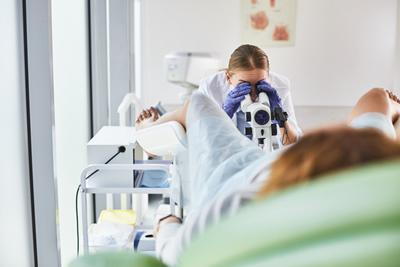What Is A Colposcopy?
- posted: May 15, 2020
 A colposcopy is an OBGYN procedure performed after abnormal test results for cervical cancer or unusual areas are detected on the vulva, vagina, or cervix. Pap smear results come back flagged if there’s a chance the cervix is infected with human papillomavirus (HPV). The entire exam takes between 5-15 minutes. The only difference between colposcopy and a Pap smear is that your OBGYN uses an instrument called a colposcope. Your OBGYN will walk you through the entire procedure.
A colposcopy is an OBGYN procedure performed after abnormal test results for cervical cancer or unusual areas are detected on the vulva, vagina, or cervix. Pap smear results come back flagged if there’s a chance the cervix is infected with human papillomavirus (HPV). The entire exam takes between 5-15 minutes. The only difference between colposcopy and a Pap smear is that your OBGYN uses an instrument called a colposcope. Your OBGYN will walk you through the entire procedure. Why You Might Need a Colposcopy
Your OBGYN has reason to believe there is something wrong with your cervix. As mentioned, irregular pap smear results require a colposcopy. If you have already tested positive for HPV, it’s also necessary. Your OBGYN might also have noticed something unusual with your cervix during a pelvic exam.
The results from your colposcopy can diagnose:
- Genital warts
- Precancerous changes to the vagina, vulva, or cervix
- Vulvar, cervical, or vaginal cancer
- Cervicitis
What to Expect During the Procedure
This is a nonsurgical procedure your OBGYN will perform in their office. You’ll undress from the waist down and put on a medical gown. The doctor will have you lie down on the exam table and place your feet in the stirrups. Next, they use a speculum to open your vagina. This opens up the walls so the cervix is more visible.
Because the procedure is somewhat uncomfortable, numbing medication or certain types of sedation are used. Once you are feeling comfortable, the next step is to clean the cervix. This gives your OBGYN a better view. The colposcope can now be used. This is a magnifying instrument placed right outside the vulva. A light shines through it and brightens the cervix. All the unusual areas on the cervix are made completely clear. A biopsy is then taken of these abnormal cells for further testing.
After everything is done, expect some mild discomfort. It’s similar to having a slight period cramp. In the next few days, you’ll experience spotting, bleeding, or dark discharge.
Before Your Appointment
You’re going to want to make sure that your appointment doesn’t take place during your period. This makes it much easier for your OBGYN to perform the colposcopy. For at least twenty-four hours before your appointment, avoid using creams like medicine, douches, tampons, and engaging in vaginal sex.
Make sure to let your doctor know beforehand if you’re pregnant or on any blood thinner medication.
Our Location
--mi
Address
100 E. Alton Gloor Blvd., BLDG B, Ste. 130
Brownsville, TX 78256
Contact Information
(956) 350-4821






